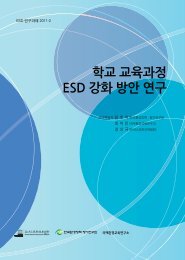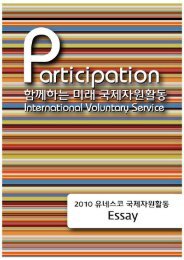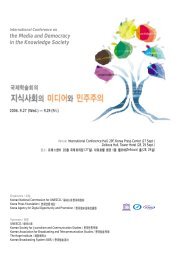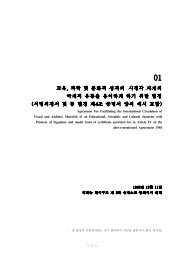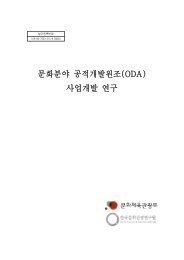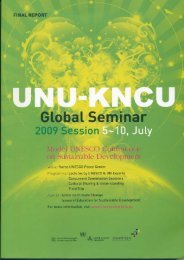íëìë³´ë2012문íì ë°ì ë¼ì´ëí ì´ë¸.pdf - ì ë¤ì¤ì½íêµììí
íëìë³´ë2012문íì ë°ì ë¼ì´ëí ì´ë¸.pdf - ì ë¤ì¤ì½íêµììí
íëìë³´ë2012문íì ë°ì ë¼ì´ëí ì´ë¸.pdf - ì ë¤ì¤ì½íêµììí
Create successful ePaper yourself
Turn your PDF publications into a flip-book with our unique Google optimized e-Paper software.
process tacitly occurs in which the temptation is automatically restrained by the important<br />
goals. Impulsive consumption choices arising from weakened self-control are most evident in<br />
health, diet, obesity, appearance, and entertainment that immediately satisfy desires, which<br />
broaden the gaps by depriving people of rational consumption items such as conservation,<br />
savings, and education. Poor people face continued gaps and the vicious cycle of poverty by<br />
repeatedly making irrational choices.<br />
The reason why self-control is weak among poor people is because they use more lowlevel<br />
construals than high-level ones. Social polarization is also due to more widely spread<br />
thoughts and behaviors of low-level construals. Low-level construers have weak self-control<br />
and indulge in instant consumption. As a result, consumption for the future decreases, and<br />
with repeated consumption, poverty becomes perpetuated (Spear, 2010).<br />
4) Poverty and Pro-Social Behavior<br />
The solution to ending the mechanism that sustains a vicious cycle is to encourage prosocial<br />
behavior, which produces positive social results. For this, it is important to match<br />
construal levels to behavioral levels. People are more cooperative when they “think about<br />
their behavior more abstractly at a high-level construal” and “think about their behavior<br />
specifically at a low-level construal.”<br />
According to previous studies, construal levels affect cooperation, and especially are valid<br />
when they guide ethical judgments and negotiations. Construal levels also interact with<br />
motives (Giacomantonio et al. 2010). High-level construals eventually guide mutually<br />
beneficial solutions in negotiations when cooperative motives are activated. Extending this to<br />
cooperation, Sanna et al. (2010) found that people behave in a more pro-social manner when<br />
their construal levels and motive levels coincide. As such, guiding pro-social behaviors by<br />
making construal levels coincide with motive levels can be an important point in tackling<br />
poverty.<br />
One of the negative opinions about aid is that recipients, complacent with immediate aid,<br />
stay impoverished rather than considering the future. Moreover, if aid continues to be granted<br />
as requested by recipients, individual recipients may enjoy more benefits, but the overall<br />
economy will be affected. Still, we cannot force recipients who follow immediate benefits to<br />
look to a far future and behave cooperatively for gross benefit in order to change their beliefs.<br />
Their motive levels are specific and at the same time short-term, so it is difficult to guide



